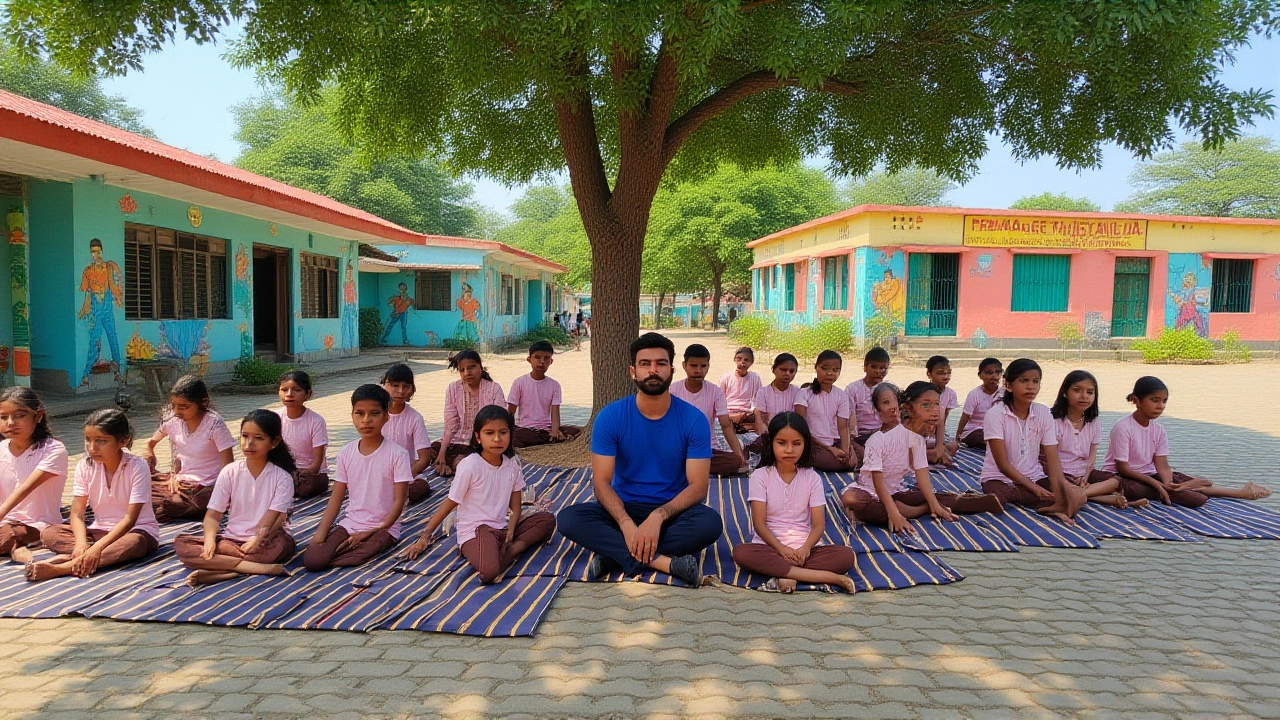On 10 October 2025, a crowd of about 150 students and teachers gathered in the small town of Babhani, Uttar Pradesh for a 45‑minute yoga session timed to the International Mental Health Day celebration.
The event was orchestrated by the Community Rehabilitation Center (CRC) Sonbhadra, a wing of the Ministry of Social Justice and Empowerment (MoSJE). The theme, “One Earth, One Health through Yoga,” echoed the official tagline of the International Yoga Day earlier that year, linking physical practice with mental well‑being.
Historical context and the rise of yoga‑centric health policies
India celebrated the 11th International Yoga Day on 21 June 2025, a milestone that prompted the Ministry of AYUSH to broaden its calendar of health‑related observances. In a policy note released in August, the ministry announced that future yoga‑driven programmes would align with other global health days, starting with the International Mental Health Day on 10 October.
That move was not just symbolic. The World Health Organization (WHO) reports that regular yoga practice can slash depression and anxiety rates by 30‑40 percent. The data gave the government a concrete health‑economic case for weaving yoga into community outreach.
Details of the Babhani programme
Following the AYUSH‑standard protocol, the session began with a brief grounding meditation, moved through sun salutations, and finished with a series of breathing exercises called pranayama. Local school principals coordinated with CRC volunteers to ensure every participant—whether a first‑timer or a seasoned practitioner—received clear instructions.
During the intermission, experts from the Indian Council of Agricultural Research (ICAR) shared insights on how diet, environment, and yoga intersect. The speaker, Dr. Ashutosh Upadhyay, Executive Director of the ICAR Eastern Research Campus, highlighted research showing that yogic breathing can improve gut health and stabilize blood sugar.
“Yoga links the body to the soul, the mind to clear thought, and the intellect to sound judgment,” Dr. Upadhyay said. “When we practice daily, we boost productivity, fuel enthusiasm, and cultivate resilience—even in tough circumstances.”
Official reactions and statements
The event drew a brief appearance from Dr. Veerendra Kumar, Union Minister for AYUSH. He called yoga “a lifestyle, not merely a physical exercise,” and invoked the ancient principle of “Vasudhaiva Kutumbakam” to stress yoga’s role in fostering global harmony.
“When we root ourselves in yoga, we nurture individual health and collective peace,” he added, underscoring the government’s commitment to making yoga a public‑health tool.
Impact assessment and expert analysis
According to the Press Information Bureau, yoga reduces stress, sharpens concentration, enhances sleep quality, strengthens digestion, and eases chronic conditions such as diabetes. The Babhani session was a live demonstration of those claims.
Local teachers reported an immediate shift in classroom energy. “Students seemed calmer, more focused, and even the chatter during breaks dropped,” said Rita Sharma, a secondary‑school teacher who participated in the session.
Health‑policy analysts point to the programme’s scalability. With over 30,000 yoga‑based events registered under the AYUSH “Yoga Sangam 2025” initiative, the Babhani event is part of a nationwide push to embed yoga in schools, NGOs, and corporate wellness plans.
Future steps and upcoming activities
CRC Sonbhadra announced that monthly yoga camps will continue throughout 2025, each tailored for different community groups. Starting 15 October, a special “Adaptive Yoga” series will cater to 15 newly‑identified persons with disabilities, supplying them with customized mats and assistive equipment.
In parallel, the Ministry of AYUSH plans to release an updated digital handbook titled “Yoga for Mental Wellness,” which will feature video tutorials, dosage guidelines, and a tracking app for schools.
- Event date: 10 Oct 2025 (International Mental Health Day)
- Location: Babhani, Sonbhadra, Uttar Pradesh
- Participants: ~150 students & teachers
- Organisers: CRC Sonbhadra (MoSJE) in partnership with Ministry of AYUSH
- Key speakers: Dr Ashutosh Upadhyay (ICAR), Dr Veerendra Kumar (Union Minister, AYUSH)
The broader aim is simple: turn yoga from a weekend hobby into a daily mental‑health anchor for rural India.
Frequently Asked Questions
Why was yoga chosen for International Mental Health Day?
Research from WHO and Indian health ministries shows yoga can lower anxiety and depression by up to 40 %. Its low‑cost, non‑pharmacological nature makes it ideal for large‑scale public‑health campaigns on a day that highlights mental‑wellness.
Who organized the Babhani yoga session?
The event was led by the Community Rehabilitation Center (CRC) Sonbhadra, a body under the Ministry of Social Justice and Empowerment, in coordination with the Ministry of AYUSH.
What benefits did participants report?
Teachers noted calmer classrooms and better concentration among students. Participants also mentioned reduced stress, improved sleep, and a sense of collective calm after the 45‑minute practice.
Will similar events happen elsewhere in India?
Yes. Under the Yoga Sangam 2025 programme, more than 30,000 yoga events are slated nationwide, including schools, NGOs, and corporate campuses, all following the same AYUSH protocol.
How can schools join the monthly yoga camps?
School administrators can register through the Ministry of AYUSH’s online portal. Once approved, CRC officers will schedule a monthly session and provide training kits tailored to the school’s size and needs.

 Government & Politics
Government & Politics